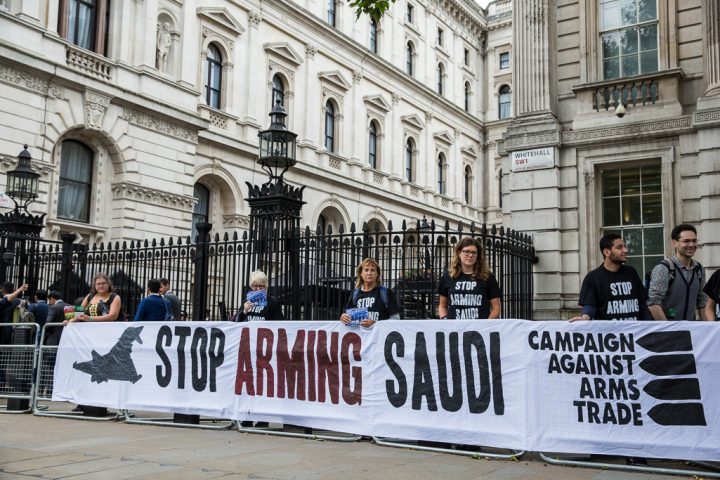Campaigners have said they will appeal a High Court decision which allows the UK Government to continue exporting arms to Saudi Arabia for use in Yemen. The verdict came despite global concern over the use of these weapons against civilians.
The legal action was brought by law firm Leigh Day on behalf of the Campaign Against Arms Trade (CAAT) against the Secretary of State for International Trade over its decision to continue to grant licences for the export of arms from the UK to Saudi Arabia.
Lawyers for CAAT argued this decision was against UK arms export policy, which clearly states that the government must deny such licences if there is a ‘clear risk’ that the arms ‘might’ be used in ‘a serious violation of International Humanitarian Law (IHL).
The legal action follows serious allegations that Saudi forces might have used UK arms to violate IHL in their ongoing bombardment of Yemen.
According to the United Nations, over 10,000 people have been killed as a result of the war. The majority of them have been killed by the Saudi-led bombing campaign. The bombardment has destroyed vital infrastructure, including schools and hospitals.
This has exacerbated the recent cholera outbreak and left millions displaced, with 80% of the population in need of aid. A recent report from UNICEF found that a child is dying in Yemen every ten minutes from preventable causes.
Despite this, the UK has continued to arm the Saudi regime. Since the bombing of Yemen began in March 2015, the UK has licensed £3.3 billion worth of arms to the Saudi regime, including:
- £2.2 billion worth of ML10 licences (Aircraft, helicopters, drones)
- £1.1 billion worth of ML4 licences (Grenades, bombs, missiles, countermeasures)
- £430,000 worth of ML6 licences (Armoured vehicles, tanks)
Today’s judgement follows a three-day hearing in February at which law firm Leigh Day, on behalf of CAAT, argued that a range of international organisations including the European Parliament and many humanitarian NGOs, have condemned the ongoing Saudi air strikes against Yemen as unlawful. In January 2016, a United Nations Panel of Experts accused Saudi Arabian forces of ‘widespread and systematic’ targeting of civilians.
Despite these serious allegations, the UK government has refused to suspend any military licences to Saudi Arabia for use in Yemen. Half of the hearings were conducted in ‘closed sessions.’ Neither the claimant nor their lawyers were able to be present for these ‘closed’ sessions.
Andrew Smith of Campaign Against Arms Trade said: “This is a very disappointing verdict, and we are pursuing an appeal. If this verdict is upheld then it will be seen as a green light for government to continue arming and supporting brutal dictatorships and human rights abusers like Saudi Arabia that have shown a blatant disregard for international humanitarian law.
“Every day we are hearing new and horrifying stories about the humanitarian crisis that has been inflicted on the people of Yemen. Thousands have been killed while vital and lifesaving infrastructure has been destroyed.
“This case has seen an increased scrutiny of the government’s toxic relationship with Saudi Arabia. It is a relationship that more than ever needs to be examined and exposed. For decades the UK has been complicit in the oppression of Saudi people, and now it is complicit in the destruction of Yemen.”
Rosa Curling of Leigh Day said: “The judgement today is very disappointing and our client has put in an immediate application to appeal which we hope will be granted.
“The law is clear: where there is a clear risk UK arms might be used in the commission of serious violations of international law, arm sales cannot go ahead.
“Nothing in the open evidence, presented by the UK government to the court, suggests this risk does not exist in relation to arms to Saudi Arabia. Indeed, all the evidence we have seen from Yemen suggests the opposite: the risk is very real. You need only look at the devastating reality of the situation there.
“We hope very much the court of appeal will consider CAAT’s claim as a matter of priority. Our government should not be allowing itself to be complicit in the grave violations of law taking place by the Saudi coalition in Yemen.”










